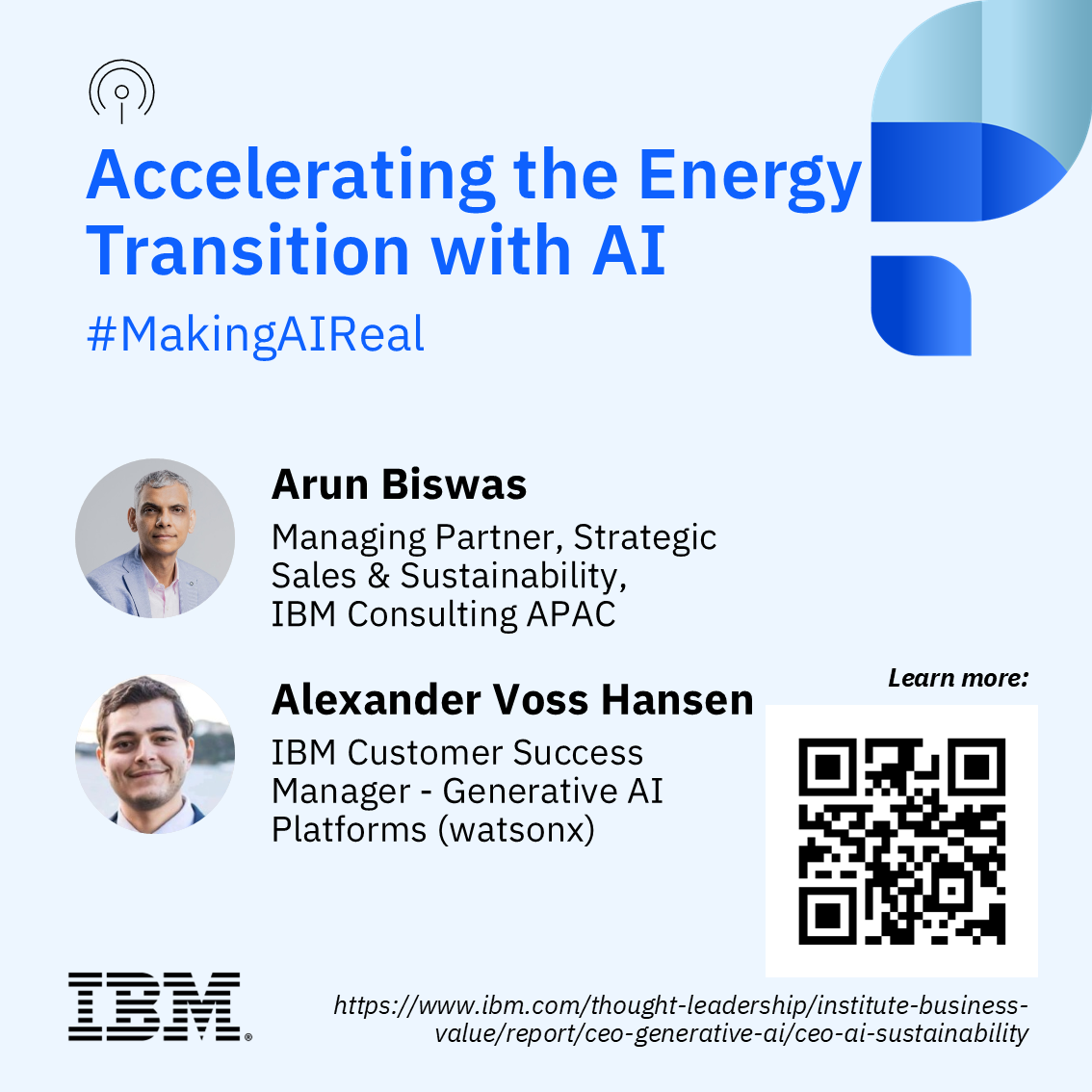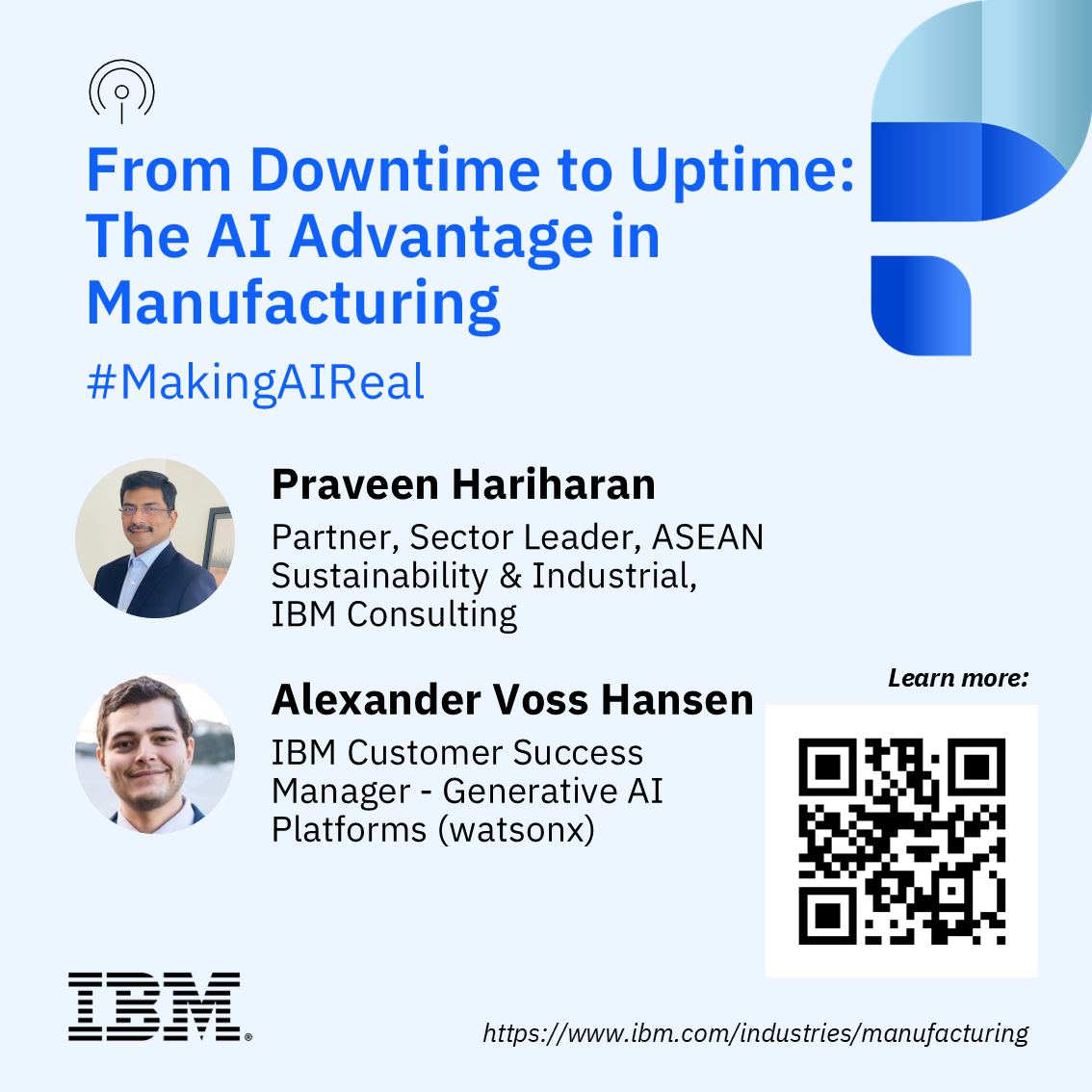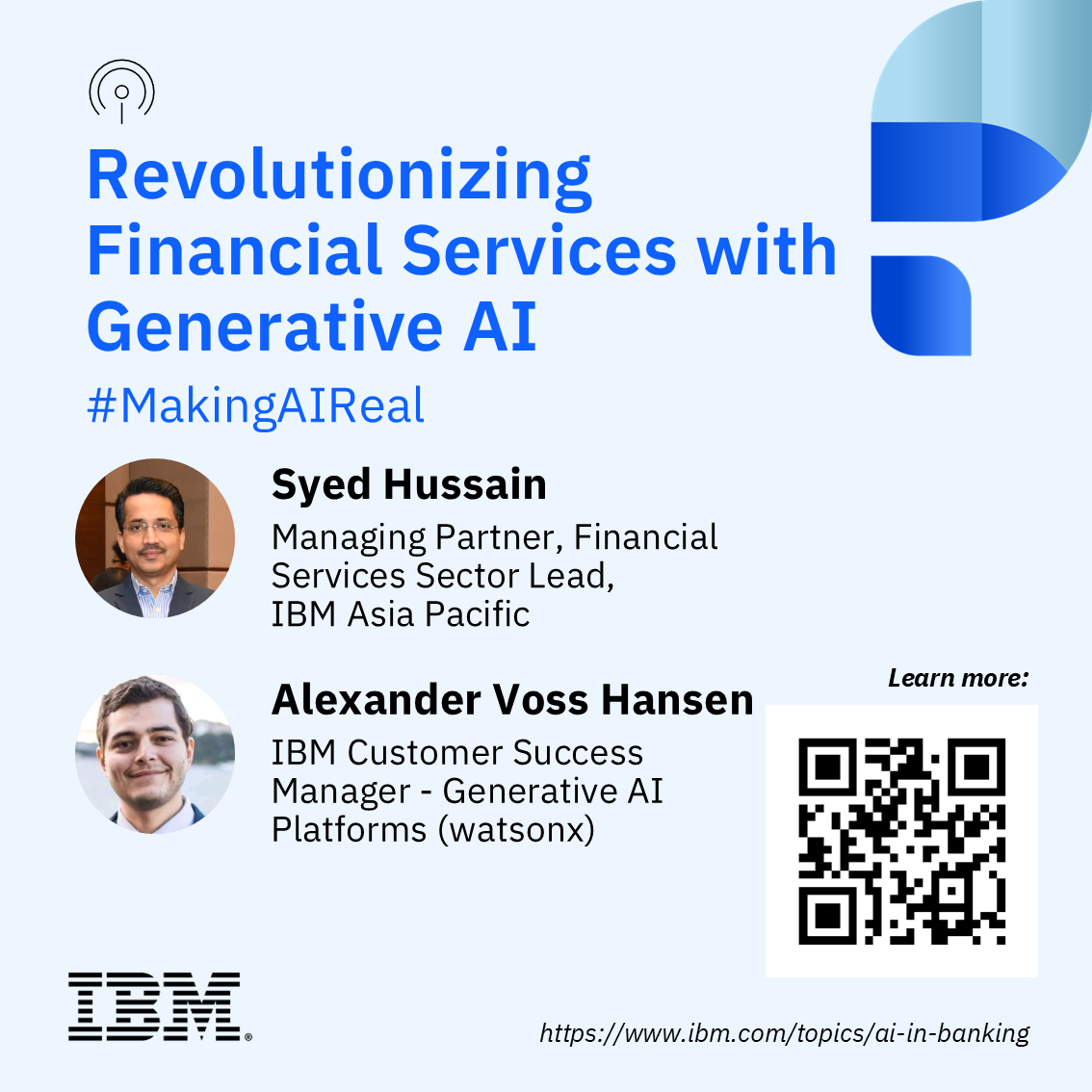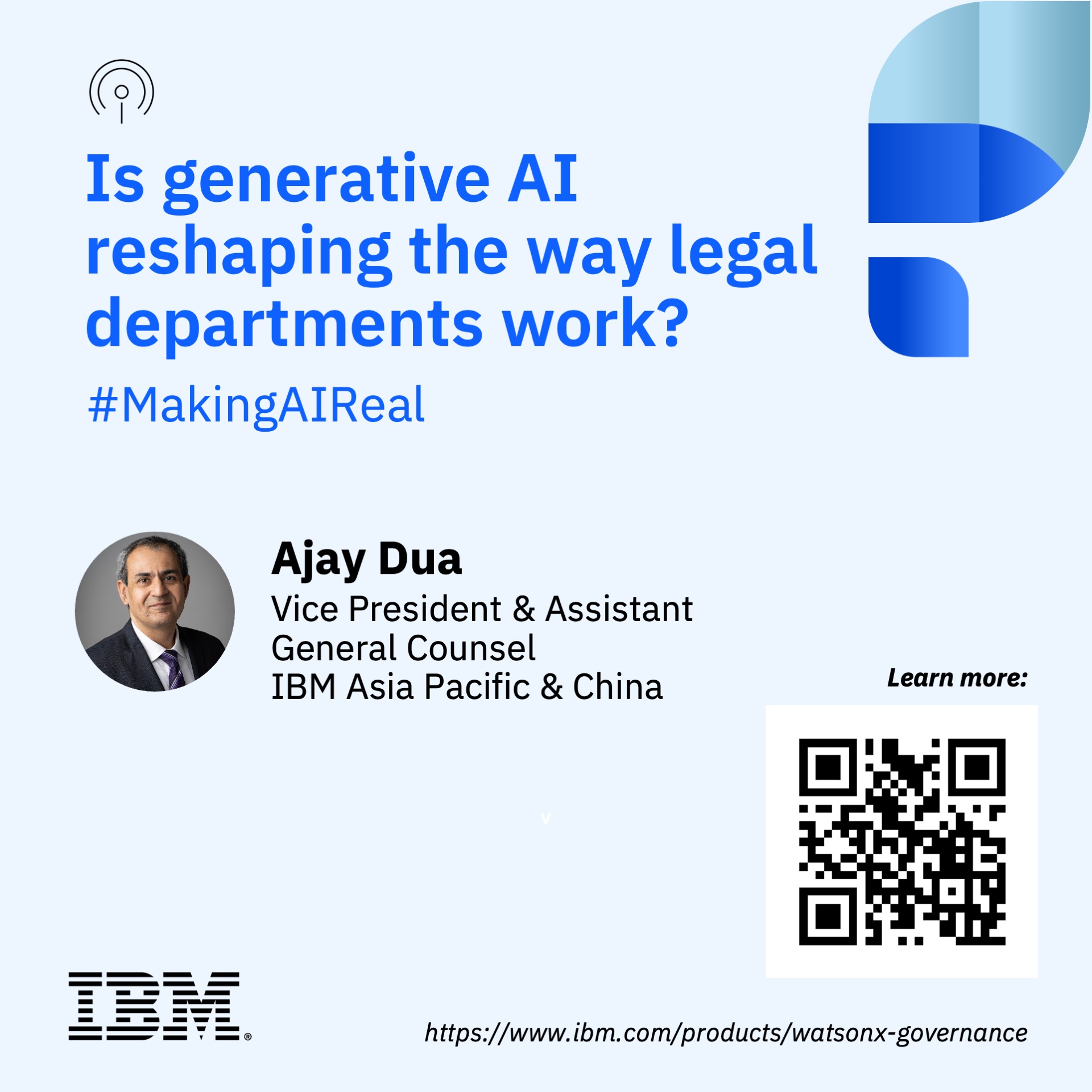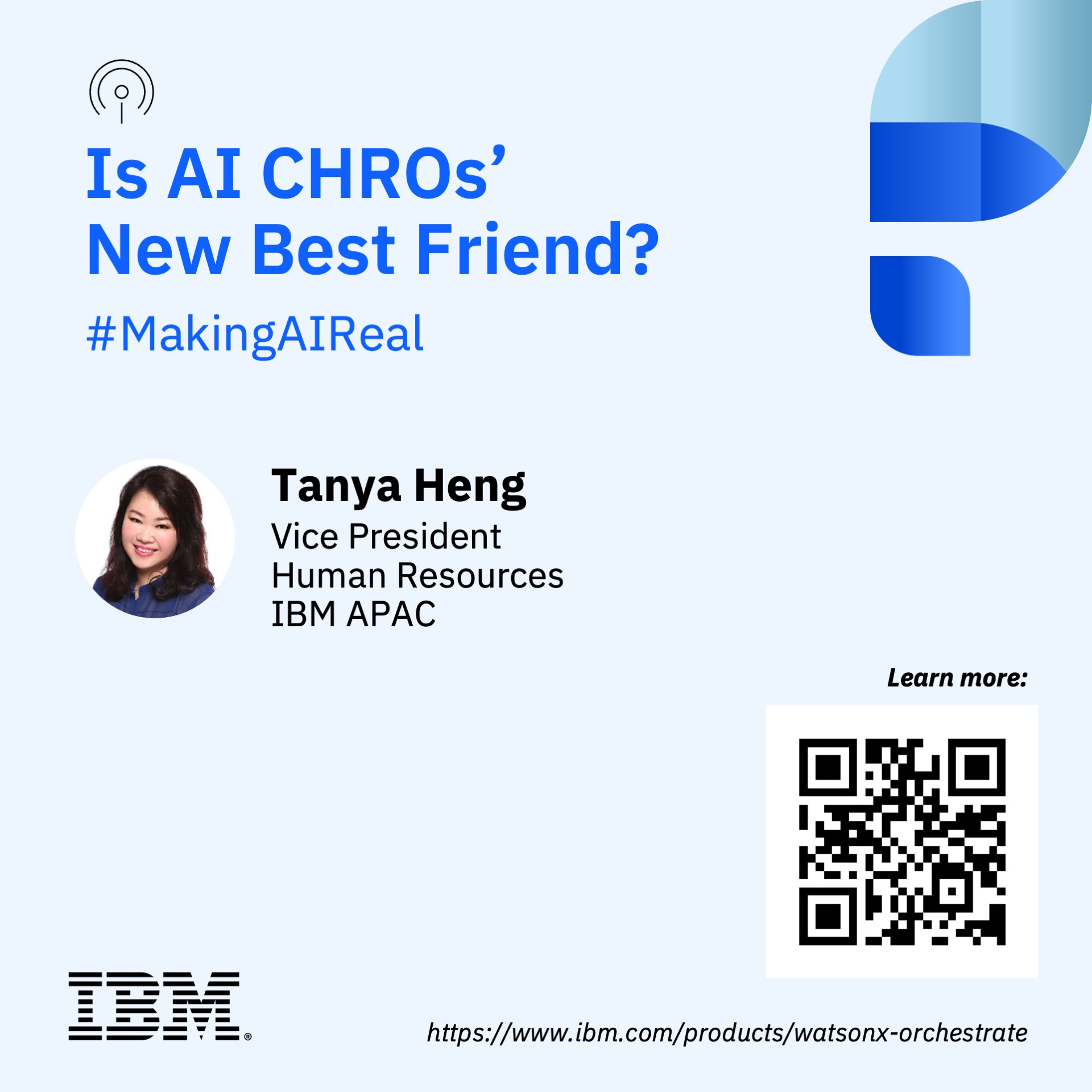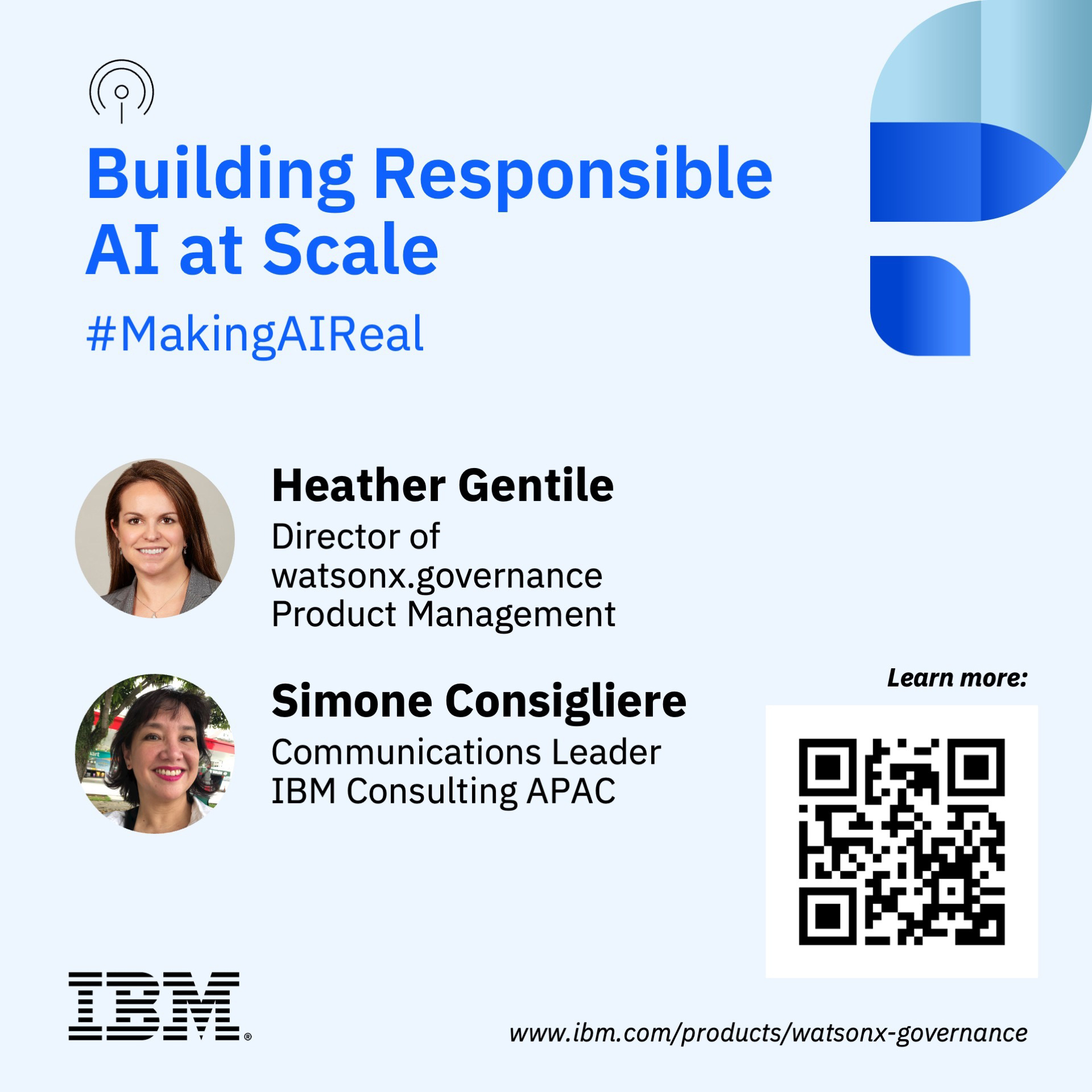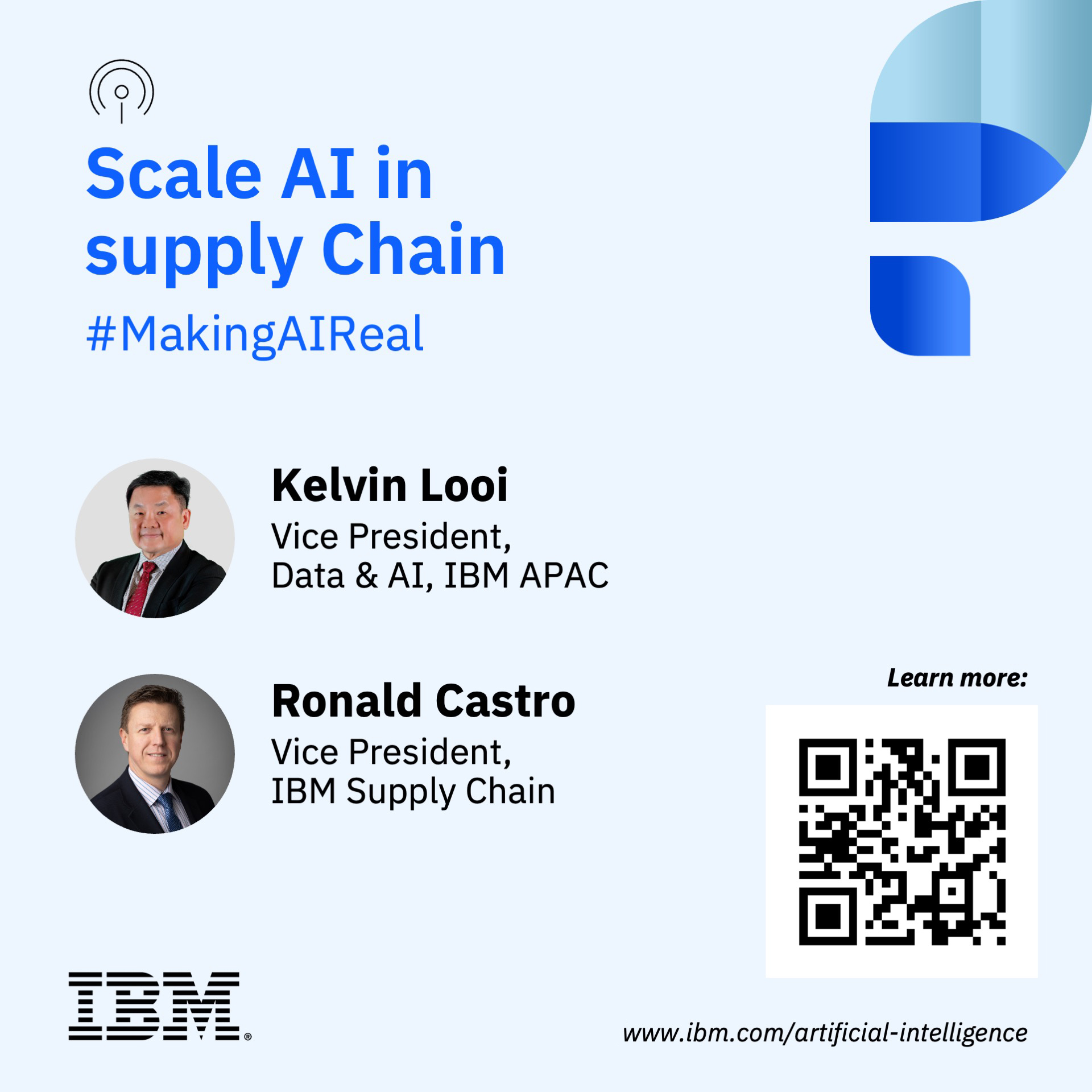Accelerating the Energy Transition with AI
- 0.5
- 1
- 1.25
- 1.5
- 1.75
- 2
Alexander Voss Hansen: Hello everyone, and welcome listeners around the world who are tuning into our 5th episode in the series dubbed, Making AI Real. It is here that we host industry experts, business leaders, and show how to integrate AI into workflows that drive business impact. We're continuing our journey rather, as we step from industry to industry now to cover sustainability, which is an incredibly topical subject. Today I am joined with Arun Biswas, Managing Director, APAC Strategic Sales& Sustainability Consulting. Welcome, Arun. It's good to have you.
Arun Biswas : Thank you, Alex.
Alexander Voss Hansen: Before we jump into it, I just wanted to quickly ask you what your perspective is on sustainability, and what made you choose this line of work?
Arun Biswas : Well, Alex, over the last 20 years I've been using technology to help our clients transform businesses, and over the last three or four years I've switched to not only helping them transform their own businesses but looking at how to impact larger societal problems. And one of the problems we'll be talking about today is energy transition, which as all of us know, is probably one of the most urgent problems which we need to solve as a society.
Alexander Voss Hansen: Absolutely, and couldn't think of a better terminology to switch. We might go into our first question. Energy transition is one of the biggest societal imperatives. Can you share some opening thoughts on the nature and complexity of the change in that industry?
Arun Biswas : Indeed. An energy transition, Alex, many perceive energy transition to be just a matter of switching from one fuel source to another, from fossil fuels to more renewable sources of energy, but it is far more complex. It's really about changing from an old energy ecosystem to a new energy ecosystem. And the new energy ecosystem that we need to build has to be smart, it has to be flexible, and has to be highly integrated. Not only that, the transition needs to be done in a manner so that it balances three key objectives, one of energy security, the other one is energy affordability, and the third one is sustainability. And businesses will need to play a big role in driving this transition. And business leaders will need to prepare their own enterprises for this transition, which will have both risks and opportunities. It'll have physical and transition risks, but the opportunities are huge.
Absolutely. It's never so simple as to just take the plug out of a coal-fired plant and stick it into a solar plant. It's quite a different supply chain that we need to be mindful of. There's a lot of different challenges that face those two ecosystems. How might AI accelerate the global transition? We are speaking about this complexity, and how and why would some of the most impactful applications be coming from AI in this space.
Arun Biswas : In my own experience and in the work which we are doing with our clients, Alex, I see four high-impact use case domains. The first one is energy efficiency, and this is highly undervalued. Now consider this, if we can just double the energy efficiency of all our operations, facilities, assets, et cetera, then we are almost a third in terms of our achievement of carbon emissions targets. And not only that, at the same time we are also saving cost. So this is where AI can play a big role. It can make assets, it can make operations and it can make facilities more energy efficient. So that's the first domain. The second domain is energy mix. If you have been following the COP28 you will know one of the global goals that we have set for ourselves is to triple the penetration of renewables in our energy ecosystem. Now this is a tall order and this tripling has to be done by the end of the decade. We don't have too much time left for this. So, in my view, AI is critical to this, and I'll explain with a few examples later in this session.
Alexander Voss Hansen: Sure.
Arun Biswas : It is absolutely important because we are talking about integration of something which is new and quite complex into an existing energy ecosystem, which has been built over years. Third is emissions monitoring. AI is quite good at direct emissions monitoring. And not only that, it's good for validation of emissions and also reporting of emissions. And the fourth area where I'm seeing use of AI, and this is probably one of the most exciting areas, is using AI to innovate and discover new solutions.
That's brilliant. I do like hearing some of the modernization that comes out of this industry is that we're starting to move away from IoT devices and maybe looking at something a bit more innovative. Maybe there's something within some real-life examples of how IBM is helping its clients to accelerate their transition journey.
Yeah, I would probably like to pick up three examples and illustrate three aspects of how AI can be used. And the first area I will start with is energy mix. We are doing work currently with a transmission utility, an electricity transmission utility in Australia. And for transmission utilities, the biggest challenge they face is in balancing the grid. The supply and demand of electricity at any point in time has to be balanced. And this challenge is only going to get much more difficult when we pump in more and more renewables into the energy ecosystem. Because think about wind and solar. Wind does not blow always. The sun only shines in the day, it does not shine at night. So you have enormous variability in demand. And then if you think about all the electric vehicles, and the rooftop solar, et cetera, which is being installed, you're also creating variability in the demand. So supply and demand are both getting more and more variable, which makes balance in the grid very, very difficult. And this is where I see one of the biggest users of AI. And one of the things we need to do is to create energy forecasts which are much more accurate. So we are working with this transmission utility to create much more accurate energy forecasts, both short-term forecasts, medium-term forecasts, as well as long-term forecasts. And long-term forecasts are needed for long-term grid planning. So you need to know what the energy consumption will be, let's say, 10 years down the line so that the grids can be planned better. We have actually developed over 3, 000 forecasts for this client using AI, and we have improved forecast accuracy by over 20%. Not only that, we have shrunk the time it takes to create this forecast by more than 90%, from months to weeks. So this is one very good example, and we are working with many utilities across the globe in this area of grid modernization, grid planning and energy forecasting. The second area I would like to pick up is emissions tracking and monitoring. And then as I mentioned earlier that emissions tracking is a good use case for AI. A lot of companies are now, especially large energy utilities as well as oil and gas companies, are experimenting with use of satellite data for monitoring of emissions. But the problem with satellite data is that it is not granular enough often, and then satellites navigate the earth at different points in time, they don't cover all areas so there are data gaps. And this is where AI can actually help you get more precise view of the emissions by triangulating data from various satellites, by filling in the data gaps, et cetera. We piloted this with a gas utility and we were actually able to detect methane emissions in their pipeline. And we also were able to detect propane emissions in their pipeline quite effectively using satellite data. And come to think of it, again, this is a use case where you not only reducing emissions, but you're also saving costs and also helping them increase their revenues, because this is a direct revenue for them. The third area I would point out is assets. If we manage your assets better, if we operate them more efficiently, and if we extend their lifespans, we are actually not only saving carbon, we are also saving materials and we are saving cost. So we are working with many asset-intensive industries to deploy AI solutions. One in particular is very exciting because it's the first time we are trying to use generative AI. And what we have done is that we have built a decision-making tool for senior executives in asset-intensive industries, like electricity utilities, for them to take many decisions. So imagine you are the CEO of an asset-intensive industry. You're probably having to make hundreds of decisions every week around your assets. Which assets to start working on? How much to allocate to each asset? Which assets to decommission and so on. And you are doing this trying to balance multiple objectives, like customer experience, revenues, profits, costs, but also sustainability compliance, et cetera, and so on. And today you are probably using heuristics, or at best a spreadsheet, to do all of this. And there's a much better way of doing it. And that's what this system does. It allows you to interact with the system and ask questions. Like, let's say the government has come up with a new sustainability regulation, what impact will it have on my asset programs? Which program should I stop? Which one should I start without impacting most of my core KPIs? Or let's say I have to reduce my budget by $5 million. Again, what decisions do I need to take? And you can do it in an interactive manner using this system. So hopefully these three examples show the use of AI in various different contexts. And these are all real life examples which we are executing with our clients.
Alexander Voss Hansen: I particularly like that concept of being able to democratize complex data in order to represent that to our C-suite, those who really are the decision makers, to make that translation from engineering to business decision can be complicated, and that is an excellent way to do so. I like that purpose-built. I do have a few additional questions for you. What I'm curious is what practical advice you might have for enterprises to address these challenges?
Arun Biswas : Yeah. So, I mean, one of the big issues we have with AI is that despite all the advancements that we have made AI use in enterprise is still not wide enough. I mean, it's not widely adopted. Many people are doing POCs, POVs, et cetera, but enterprise scale adoption is still quite limited. And if you think about the challenges they face, I will point out four in particular, extracting the ROI or the business value out of AI is still quite difficult. There are some serious issues with trust, ethics and security. These models can, as you know, hallucinate. They can provide inaccurate information, and there are issues with data privacy, et cetera. The third area is skills. I mean, there are just not enough skills in both sustainability and AI to be able to build these and balance these kinds of AI algorithms and models. And fourth, there is an increasing concern about the carbon footprint of AI, because some of these models are quite energy intensive, both in their training and inference phases. Now, what I would advise enterprises in the energy ecosystem to think about is a holistic approach to deploying AI. And this is not just about selecting the right models and data, though that is paramount, but it's also looking at things like AI strategy, looking at change management, how to build your internal skills and your operational governance. And on the topic of models and data, we strongly believe that in the enterprise context models need to be purpose-built. In an enterprise context we don't need to have AI models that can write poetry in the style of Shakespeare. I need them to do very specific tasks, like time series forecasting, for example. And again, as we all know, the quality of the output of the model depends highly on the quality of the data. And in the case of an enterprise, you need to use enterprise data. So enterprises need to pay a lot of attention to sourcing data, gathering data, cleaning data and keeping it ready, both internal and external data. So that's the other advice I'll have for them. The third is having a very strong technical governance of managing the models and data. The fourth is making sure that the decisions which come out of AI are both traceable and transparent. And this is where, from an IBM perspective, we always advocate for open models, which can be examined, which can be explained. And finally, enterprises have to be conscious about the carbon footprint of these models. You don't always need very large models with billions and trillions of parameters. We have shown in IBM that even with much smaller models, like our latest time series model, with just a few million parameters you can be as effective as a large model. So all of these considerations need to be kept in mind while deploying AI, if you really want to scale AI.
Alexander Voss Hansen: I really enjoy your perspective on building a strategy around it. It is a requirement for most business units to have a strategy for their environmental impact, have a strategy for their automation over the next 2, 3, 5 years. Now we're starting to see that rise of AI strategy within business, and you made me rethink the concept of trying to integrate that in AI strategy into your other business strategies and really reopen that conversation across the board.
Arun Biswas : Yeah, and not only that, Alex, I mean it's also the operational governance. Many people miss this still. They stop at technical governance and don't extend to operational governance. You need to think about things like, who are you entrusting in your organization to make decisions regarding AI? Who's really accountable at the end of the day? How are you going to manage and monitor this? How are you going to take into account things like ethics of this? In IBM, for example, we have an ethics board which controls the use and deployment of AI. So things like these also become very important.
Alexander Voss Hansen: Absolutely. Setting guardrails, setting operational metrics that we can keep without hindering the progression of the technology is really going to be that sweet spot for us to help accelerate businesses. I do have one final thing. Do you have any closing thoughts?
Arun Biswas : I do indeed, Alex. I think we all need to remember that we are running out of time. 2023 was the hottest year on record. 2024 is all set to beat that record. We are way off track in terms of our net-zero goals. We have to do a lot in a very, very short span of time. And we need exponential technologies combined with new ways of business, new business models. We need new economic systems. We need closer collaboration between industry, governments, et cetera. We need proper regulation standards. There's a lot we need. So we really need to put everything in into the mix here. And AI is one of those exponential technologies. AI is not a silver bullet. It has its downsides and it needs to be managed. But if it is deployed in a trustworthy and responsible manner, it can be a very, very effective tool. It can really augment humans, it can accelerate decisions as we have seen through these examples. So I really would encourage all business leaders to consider AI as a part of their toolkit, I would say, to drive both their business performance and their sustainability KPIs.
Alexander Voss Hansen: We really have to break through that concept of virtue versus compliance when it comes to sustainable platforms. Thank you, Arun. I really appreciate your time today. I enjoyed this inaudible.
Arun Biswas : Thank you.
DESCRIPTION
Making AI Real | Episode 5: Accelerating the Energy Transition with AI
🌍 How is AI driving the global energy shift?
In Episode 5 of Making AI Real, host Alexander Voss Hansen, IBM Customer Manager for Generative AI Platforms (watsonx), and speaker Arun Biswas, Managing Partner for Strategic Sales & Sustainability, IBM Consulting APAC, explore how AI is helping to create a smarter, more flexible, and sustainable energy ecosystem.
Listen to the podcast to understand more about AI’s crucial role in driving the energy transition – beyond just switching to renewables.
Download the latest IBM Institute for Business
Value report to understand how generative #AI can help organizations build a
more sustainable future: https://www.ibm.com/thought-leadership/institute-business-value/report/ceo-generative-ai/ceo-ai-sustainability
